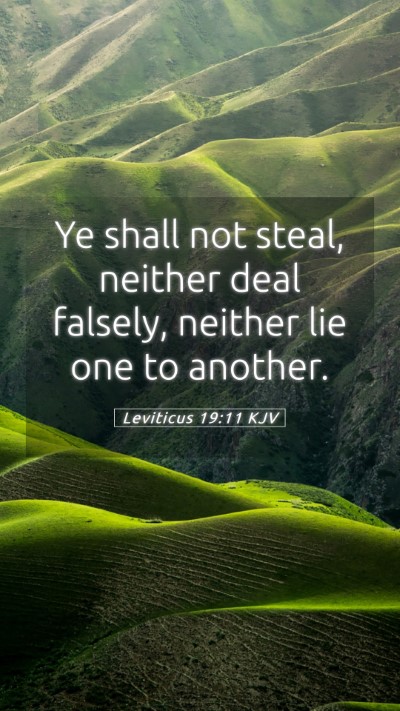Bible Verse Commentary on Leviticus 19:11
Bible Verse: Leviticus 19:11 - "You shall not steal; you shall not deal falsely; you shall not lie to one another."
Understanding the Meaning of Leviticus 19:11
This verse is a direct command from God to the Israelites regarding their moral and ethical behavior. It encapsulates three prohibitions that protect the social fabric of the community.
1. Biblical Exegesis and Context
In examining Leviticus 19:11, we must understand it within the broader context of the Holiness Code (Leviticus 17-26), which instructs Israel on how to live as God's chosen people. Matthew Henry notes that these commands emphasize the welfare of the community as a reflection of one's relationship with God.
2. Prohibition Against Stealing
- Meaning of Stealing: To steal breaches trust and undermines relationships. Adam Clarke explains that theft damages the common good and individual dignity.
- Biblical Principle: The prohibition against stealing affirms the right to personal property and respect for others’ possessions, which is foundational to a just society.
3. Dealing Falsely
This part of the verse addresses dishonest dealings. Albert Barnes points out that honesty in trade and personal interactions is essential for maintaining trust within the community. Dealing falsely is akin to a betrayal of communal bonds.
4. Prohibition Against Lying
- Importance of Truth: The command not to lie signifies the importance of integrity. Matthew Henry remarks that lies erode trust and can lead to great harm among individuals.
- God's Character: God is truth; therefore, His people are called to reflect that character through honesty in their words and actions.
Application of Leviticus 19:11 in Daily Life
These commandments remain relevant today. When we uphold integrity, honesty, and respect for others' property, we foster healthier relationships and communities. Applying this verse can guide one in business practices, interpersonal relationships, and moral decisions.
Bible Study Insights
For those exploring this verse in Bible study groups or online Bible studies, it can spark discussions on:
- How to cultivate honesty in our lives.
- The consequences of dishonesty in society.
- Real-life applications of God’s commands in contemporary situations.
Related Bible Cross References
- Exodus 20:15 - "You shall not steal."
- Proverbs 12:22 - "Lying lips are an abomination to the LORD, but those who act faithfully are his delight."
- Zachariah 8:16 - "These are the things that you shall do: Speak the truth to one another; render in your gates judgments that are true and make for peace."
Conclusion
In summary, Leviticus 19:11 provides profound insight into biblical ethics concerning theft, deception, and honesty. Understanding these principles through Bible verse commentary, such as those from Matthew Henry, Albert Barnes, and Adam Clarke, helps clarify the significance of these commands and their application in our lives today. The verse not only instructs us on abstaining from negative actions but also enriches our pursuit of integrity and truthfulness within our communities.


